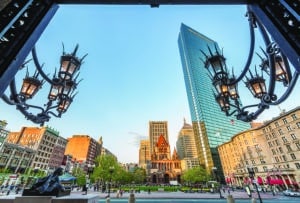
Copley Square, where former Boston City Councilor Josh Zakim hopes to open a recreational marijuana shop. Zakim would be only the latest in a number of well-connected political insiders to seek profits in the new industry.
Just call it the cannabis gold rush.
The legalization in Massachusetts of the once forbidden aromatic weed has been accompanied by wonderful rhetoric about righting the wrongs of the drug war and transforming its victims into budding entrepreneurs.
But there’s a stampede for lucrative pot shop licenses in Boston, with the politically connected and big corporations are at the head of the line.
And that should raise some serious questions.
Simply put, has the launch of the cannabis industry in the state degenerated into the same old, very Massachusetts game of political insiders and companies with the best-connected lobbyists grabbing the choicest opportunities for themselves?
There are some troubling signs.
A Copley Connection
Josh Zakim, a former Boston city councilor turned housing activist, has teamed up with a pair of business partners to push plans for Copley Connection, a cannabis shop that would take shape in Back Bay.
Zakim, along with Senam Kumahia, vice president of Carpenter & Co. Inc., and Victor Chiang, a Wellesley resident and one of the co-founders of Cypress Tree Management, made the pitch for their proposed pot shop at a public meeting last Wednesday.
While a fair number of supporters showed up for the virtual meeting on Zoom, not everyone is thrilled, with the plan sparking opposition from the Neighborhood Association of the Back Bay.
Among other things, the operation would sit directly across Boylston Street from Copley Square, which is undergoing a $15 million revamp by the city. The cannabis shop is also several hundred feet from the Snowden International School.
“It’s a park,” Elliott Laffer, chair of the Neighborhood Association of the Back Bay, told Contrarian Boston. “It is a park the city is about to put a chunk of money into upgrading.”
“There are better locations – we have told the applicant that,” he added.
For his part, Zakim counters that he and his family live within a block or two of the now-shuttered Wendy’s restaurant on Boylston Street where he hopes to open his establishment.
Zakim contends he wouldn’t support a business that he thought would be detrimental, and that his children will be walking by every day.
But he also sidestepped the question of whether his past public service gives him an unfair edge in the competition for pot licenses and sites.
Zakim was a well-respected city councilor who has done great work on the housing advocacy front since leaving City Hall. That said, it’s a fair and legitimate question to ask.
The Problem’s the System
But let’s not pick on Zakim, for he is hardly alone. Another former city councilor, Mike Ross, has become the go-to legal guy for anyone proposing a cannabis shop in Boston, while another former councilor, Tito Jackson, has his own downtown cannabis business, Verdant Reparative.
Nor is it just the local pols who are hanging out their shingles in the booming business of legalized cannabis.
Big corporations, often working through local reps, have also played an outsize role in snapping up pot licenses, the Boston Globe reported in 2019 in a Spotlight story.
A lawsuit in state court has laid bare the kind of jockeying that has gone one for these lucrative pot shop licenses behind the scenes by politically wired locals and major corporations.
Geoffrey Reilinger, who first proposed building a cannabis dispensary at 331 Newbury St. back in 2017, has sued his former partners, namely publicly-traded Canadian pot giant GTI, the company’s CEO and CFO, and a subsidiary, for potentially millions in damages.
His big beef? GTI messed up the project and its chances for regulatory when it got rid of the team of 13 different public relations, lobbying and other professionals Reilinger had assembled, including a former press chief for the late Mayor Thomas M. Menino.

Scott Van Voorhis
“The Defendants believed they were sophisticated enough of operators to open in the City of Boston without using local 13 professionals. This was untrue, and further contributed to the delay in opening the Newbury Street Location,” Reilinger’s attorney writes in a complaint filed in Suffolk County Superior Court.
Getting a license to run a cannabis shop or dispensary is a highly complex process in Massachusetts, one involving approvals from at least three different city and state boards.
If you have the right connections – and understand how to navigate the government bureaucracy – there could be cannabis gold at the end of the tunnel.
But if you don’t, you may very well be left on the outside looking in. That doesn’t seem fair. And too often, it’s the way business is done here in Massachusetts.
Scott Van Voorhis is Banker & Tradesman’s columnist; opinions expressed are his own. He may be reached at sbvanvoorhis@hotmail.com.





